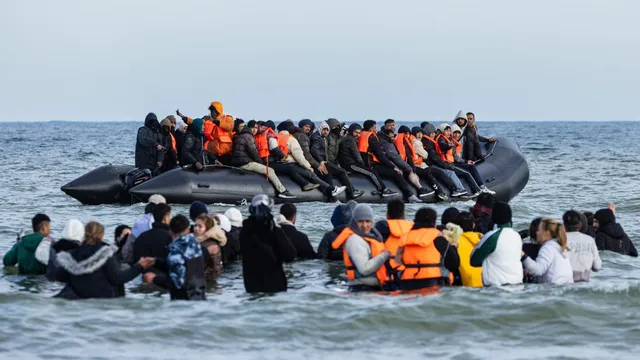
Record number of Eritreans fleeing to Britain via the English Channel
2025-04-08 00:00- More than 1,200 Eritreans crossed the English Channel in the first quarter of 2025, surpassing other nationalities.
- Cheaper prices from smugglers have attracted a larger number of Eritrean migrants fleeing conflict.
- The rise of Eritrean migrants poses significant challenges for the UK government in addressing their needs.
Express your sentiment!
Insights
In the early months of 2025, more than 1,200 Eritreans crossed the English Channel in small boats, making them the largest group of migrants from any nationality to undertake this perilous journey. This shift marks a significant increase compared to previous years, where Afghans were the predominant group making such crossings. Factors contributing to this rise include a recent drop in smuggling prices and ongoing tensions in Eritrea, particularly the looming threat of war with Ethiopia, which is pushing more migrants to seek refuge abroad. As the conflict in Ethiopia creates a more volatile environment in the region, Eritreans are increasingly compelled to leave their homeland in search of safety and better living conditions in Europe. The journey across the English Channel remains dangerous, yet the improvements in smuggler logistics and reduced costs have rendered it more accessible, attracting a larger wave of economically disadvantaged migrants. Official figures indicate that Eritreans now make up 20% of the total migrant population that has crossed the Channel, which is approximately 6,642 individuals so far this year. This statistic is particularly notable as it highlights the dramatic increase in transits compared to the same period last year. Across Britain, the number of Eritreans seeking asylum has also surged, with approximately 5,500 individuals currently residing in taxpayer-funded accommodations, half of whom are residing in hotels as a temporary measure while their claims are processed. The situation represents not just a trend in migration but also a humanitarian challenge for the UK and Europe, as authorities grapple with the increasing number of arrivals and the implications for healthcare, housing, and social support services. As the crisis unfolds, discussions around the business model of migrant smuggling are intensifying, and governments face the dual challenge of addressing the root causes of this migration while ensuring the safety and well-being of those who decide to undertake such risky endeavors.
Contexts
Eritrea, a small country located in the Horn of Africa, has experienced a surge in migration over recent years. This phenomenon can be attributed to a multitude of factors that compel Eritreans to seek better opportunities and living conditions abroad. One of the primary reasons for this exodus is the repressive political environment in the country, characterized by an absence of fundamental freedoms, including freedom of speech, assembly, and press. The government, led by President Isaias Afwerki since Eritrea's independence in 1993, has maintained a one-party rule, suppressing any political dissent and leading to widespread human rights violations. The limited political space and the looming threat of indefinite national service further exacerbate the population's desire to flee. National service in Eritrea is often cited as one of the harshest in the world, with conscripts facing prolonged periods of servitude, low wages, and poor living conditions under military command, prompting many to escape in search of autonomy and a better life elsewhere. Economic hardship is another significant factor driving Eritreans to migrate. The country continues to grapple with severe economic challenges, including a lack of job opportunities, high unemployment rates, and a low standard of living. The government's control over most sectors of the economy limits private enterprise, leading to stagnation. Many Eritreans, especially the youth, find themselves disillusioned by the lack of prospects within their home country, pushing them towards migration as a means of pursuing education and employment opportunities abroad. The desire for a more stable and prosperous future highlights the desperation felt by many, further incentivizing the migration trend. Social factors also contribute to the increasing number of Eritrean migrants. Family reunification plays a significant role, with many individuals already having relatives abroad who have successfully built stable lives in different countries. This existing diaspora creates networks that facilitate migration through shared resources, advice, and emotional support. Moreover, the deteriorating education system in Eritrea frustrates students who aspire to attain higher learning; many seek opportunities abroad to pursue their educational goals in a more conducive environment. The legacy of strong community ties and shared aspirations among Eritrean families drives many to follow in the footsteps of their relatives, thereby sustaining the cycle of migration. Finally, geopolitical dynamics in the region have also influenced Eritrean migration patterns. Conflicts in neighboring regions, along with the Eritrean government's restrictive policies, push individuals toward safer and more stable countries. Many Eritreans attempt treacherous journeys across borders, risking their lives in pursuit of freedom and better living conditions. The combination of political oppression, economic strife, social networks, and regional instability creates a complex web of motivations behind why Eritreans are migrating in larger numbers than ever before, and understanding these factors is crucial for addressing the underlying issues driving this significant demographic shift.